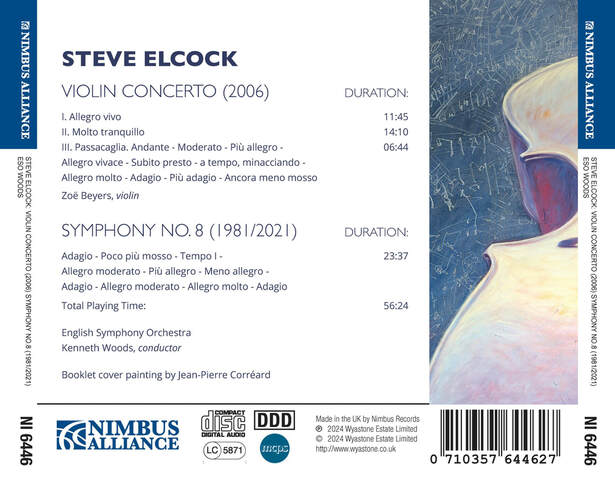All three works on De Lumine, by Hjálmar H. Ragnarsson, Hugi Guðmundsson and Viktor Orri Árnason, were commisioned by Sif Margrét in 2020 and premièred by her soon after in the concert series Bach and Modernity. The project comprised three concerts including these contemporary works alongside J.S. Bach's three 1720 Sonatas for Solo Violin. This created a musical conversation between composers 300 years apart.
The Icelandic composers span three generations, all well established in their fields. Their works reveal strikingly different characters: the only guideline for the commissions not to include any electronics – to retain a close connection to Bach's work, otherwise the composers had complete compositional freedom to explore the violin's endless musical and technical possibilities. De Lumine is the world première recording of these new works.
De Lumine's launch concert will take place on Sunday 10 November at the Harpa Concert Hall, Reykjavik.
Hjálmar H. Ragnarsson (1952-): Partíta (26’) – 5 movements
Hugi Guðmundsson (1977-): Praesentia (16’)
Viktor Orri Árnason (1987-): Dark Gravity (19’) – 4 movements
'The Partíta is not ”about” anything – notes, intervals, rhythms, phrases, the violin in the hands of the violinist – the sounds of the bow on the string and the magic happens – but no particular meaning or message! it is wonderfully liberating to write music ”about” nothing in particular – music which is itself and only about itself.'
Hjálmar H. Ragnarsson
Hugi Guðmundsson was born in Reykjavik in 1977. He continued studies in Denmark and finshed his Master’s degree in composition from the Royal Conservatory of Music in Copenhagen and a second Master’s degree in electronic and computer music from the Sonology Institute in The Hague, The Netherlands. Hugi’s music ranges from solo works to orchestral pieces. He has been awarded many prices for his works both in Iceland and internationally.
'The title Praesentia depicts the opposite of absentia, so it might be understood to describe presence. The piece is in a rondo form of some sort where the music constantly gravitates toward a simple reserved chorale with repetitive chords. In between them the violin goes on an adventure of virtuosity.' Hugi Guðmundsson
Viktor Orri Árnason was born in Reykjavík in 1987. Viktor studied violin and viola at the Icelandic University of the Arts and composition and conducting at the Hochschule für Musik Hanns Eisler in Berlin.
'I was inspired by one of the great mysteries of the world – would you believe that when we calculate the total mass of the reality that we know and understand to be true that is the stars, galaxies, blackholes – there seems to be missing 85% of the mass that we define as reality. The piece Dark Gravity wonders about the nature of this unexplainable mass.' Viktor Orri Árnason

During her career Sif Margrét has performed as soloist on numerous occasions in such works as Gubaidulina’s Offertorium, Lutoslawski’s Partita, Mendelssohn’s Violin Concerto and Bach Violin Concerto in E major. She collaborates regularly with pianists in sonata recitals, most recently in February 2024 at the Harpa Recital Hall performing a programme of French music including the Sonatas by Debussy, Ravel, Pauline Viardot and Lili Boulanger.
Sif Margrét served as Associate Concertmaster of the Icelandic National Symphony Orchestra for a number of years acting regularly as Concertmaster. In recent years she has also performed with many esteemed orchestras in Germany such as the Berliner Philharmoniker.
Sif Margrét is involved in creating interesting and inspiring concert programmes and has been the Artistic Director of many concert series as well as being the main performer. This includes a Beethoven VIolin and Piano Sonata cycle, and recently Bach and Modernity, the inspiration for her album De Lumine.
Electronic press kit and listening links available for reviewers and radio stations.















































